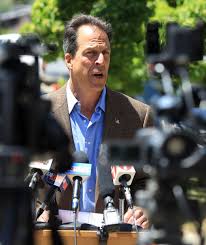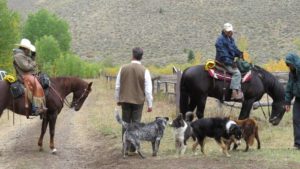Blaine County Commissioner
Public service and community growth.
January 21, 2019As term ends, a commissioner considers legacy,
Larry Schoen looks back at a career in public life
by Mark Dee
Idaho Mountain Express
“I think elected office is immensely challenging. And I felt that, on a personal level, I needed that sort of challenge. I needed to try to live up to my ideals of public service.” Larry Schoen, former Blaine County commissioner
Schoen, who is 63, has had time to consider how a self-described private man transitioned to so public a life in Blaine County. And, he’s had time to consider his motto, which he attached to that career like a goal more than a decade ago: “To leave office with my integrity intact.”
He sat through plans for rampant growth, and saw them hollowed by the global belt-tightening of the Great Recession. He presided during natural disasters, fires and floods that wolfed up swaths of the Wood River Valley in quick and angry bites. He worked on wolves themselves, and other environmental fights that pitted interest against interest. There was Bowe Bergdahl, and the frenzy that swept through Hailey afterward. There were debates with Idaho Power, and Deer Creek and Camp Rainbow Gold—and thousands of other rulings, small to most everyone but the world to those involved, the discrete decisions that make up a career in politics that, at times, surprised Schoen himself.
“I’m a very private person,” he said. “You won’t find a Facebook page for me. You won’t find a lot of personal information out there. I hate having my picture taken, and I’m not very good at remembering people’s names. I’m not the sort of person you’d think of as primed for political life. But I think government service is important. I think elected office is immensely challenging. And I felt that, on a personal level, I needed that sort of challenge. I needed to try to live up to my ideals of public service. ‘To leave office with my integrity intact’—it all goes back to that.”
He turned 18 in 1973, a draft year at the ragged end of America’s involvement in Vietnam. It was a lottery—just luck that his number wasn’t called. Today, with the safety of decades between then and now, he wishes it was.
“I never did military service—I always regretted that,” he said. “I felt that at some point in my life, I needed to do some sort of serious public service. In a way, on a personal level, running for public office was my way of compensating.”
If his work as a reporter helped him explain policy, his life as a farmer helped shape it. He’s tried the three main modes of American living—urban, rural and suburban—and his view for the future of Blaine County is steeped in that experience.
“Hardly anybody has put as much effort into reading things, and parsing language,” said Len Harlig, a former county commissioner who remains a close observer of Blaine County politics. “He’s absolutely meticulous, going through materials to make sure they are correct, and accurate. He brought an efficiency to ordinances. His viewpoint was thorough, exhaustive and unaccepting of any comment not based in vigorous research. Even when you reached different conclusions, you never doubted the effort.”
His environmental record can match anyone’s in the county, according to Harlig, whether that meant advocating for conservation, or securing easements for open space and recreational access, or updating recycling and solid waste.
But Schoen describes himself as a progressive, and a pragmatist. Those combine to form a view of government that is closely tied to customer service, and much of his legacy—from internal communications, to organizational structure, to budgeting procedure—is, like the engine of any operation, hidden under the hood.
“As a county commissioner, Larry was a consummate professional,” said current board Chairman Jacob Greenberg. “His journalism background meant he was our go-to person to articulate policy.”
“Some of the most desirable and valuable communities in America have some of the strictest zoning—thought-out zoning codes that try to project the present and future values of those communities,” he said. “That’s especially true of small ski towns in Europe. And that’s why they still have their charm. We don’t want to lose our charm.”
Maintaining it was part of the Blaine County 2025 planning effort that Schoen participated in during the mid-2000s, as a member of P&Z. Back then, elected officials prepared for an unending boom. There was talk of two new towns—one by Gannett, another at Timmerman Junction. Projections envisioned the population swelling to 80,000 people in 20 years. Soon, Schoen thought, development pressure would burst out into the unincorporated county like champagne past a cork.
“I don’t know that they are all on the same page,” he said. “People acknowledge certain common values, like the need for affordable housing, the need to preserve our public lands and recreational access. The conversations really haven’t been had in a long time. Ketchum is doing its thing. Sun Valley does its thing. Hailey’s doing its thing. We need to work on a regional equation. If people are opposed to increased density in cities, but there’s development pressure, there’s only one place for it to go, and that’s out in the county. The question is, do we want to turn it into a suburbanized area? That’s a question for the community. The community needs to answer.”
Schoen’s personal answer is written across his land. He placed a conservation easement on the property curtailing its ability to be developed; those acres will never be subdivided.
“I would judge his view of county government as that of a purist,” he said. “He interpreted it as it was intended, and was fair in its application.”
Schoen: “When I talk to students, I tell them if you’re going to enter elected office, your main goal shouldn’t be to get re-elected. It should be to do what’s in the best interest of the community. To uphold the law. In a very dynamic, engaged county like ours, that will leave some people happy. Others won’t be. Eventually, that catches up with you.”
“There are roles I’ve been able to play because I was a county commissioner. I’m proud of the connections I’ve made, what I’ve been able to do. This job’s been immensely rewarding—for me personally, and, I hope, for our community.”


